A1B Gold Nanobipyramids Additional Information
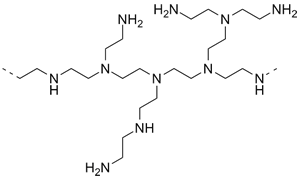
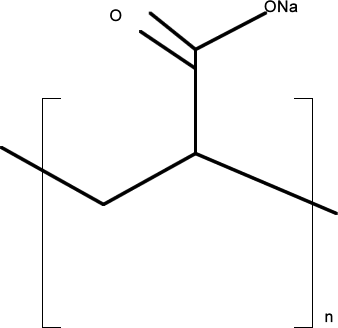
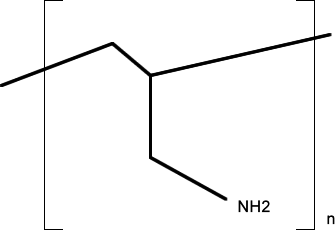
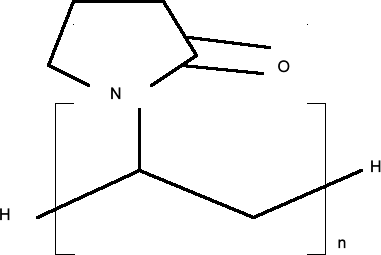
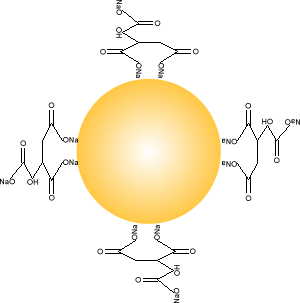
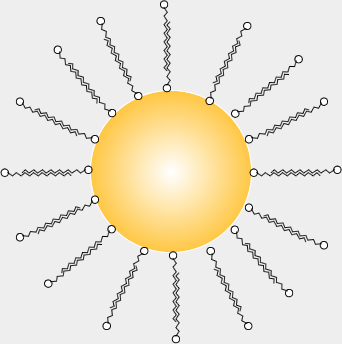
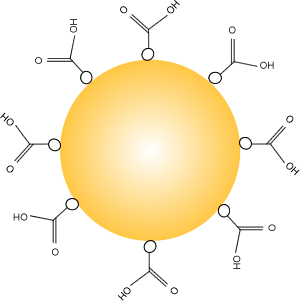
| MW | MW (g/mole) | Zeta Charge (mV) | Salt Resistant? | Concentration Sensitive? | Easy to adsorb Proteins? | Easy to Thiolate? | Shelf life at 4C |
| Citrate | 192 | -35 | 1.5mM | Yes | Yes | Yes | 6 months |
| Nanopartz Carboxylic Acid | 212 | -30 | 15mM | Less than Citrate | Better than Citrate | Better than Citrate | years |
| PEI | 100K | 30 | 150mM | No | Yes | Yes | 6 months |
| PAA | 10K | -30 | 150mM | No | Yes | Yes | 6 months |
| PAH | 10K | 20 | 150mM | No | Yes | Yes | 6 months |
| PAA | 40K | -10 | 0.5M | No | Yes | Yes | 6 months |
| CTAB | 364 | 35 | 0.5M | Yes | Yes | No | 6 months |
| BSA | 66K | -15 | 0.5M | No | No | No | 6 months |
Composition
These gold nanopyramids are shipped in DI water with no measurable residual reactants. These particles are not manufactured in citrate. Citrate and the other ligands are functionalized after manufacturing allowing for a minimal, controlled amount of ligand to be used.
Custom Formulation
Diameters 30 to 50nm with SPRs from 780 to 980. Other sizes are special order. Please contact us.
Quantity
This product is available in 5mL volumes and larger. For orders larger than 1L, or for orders amounting over 10L per annum, please contact sales for quantity pricing.
Delivery
Standard sizes are in stock. Special order sizes are shipped in two weeks or less. All domestic shipments are sent Fed Ex Standard Overnight delivery, international Fed Ex Priority 2 day. No shipments on Fridays except for dried particles. Saturday shipping available for extra charge.
Functionalization
This product comes with different adsorbed ligands: our proprietary carboxylic acid, citrate, and with PEI, PAH, PAA, BSA, and PVP polymers.
Shelf Life/Storage Temperature
This product is guaranteed for six months and should be stored at 4 °C after opening. Care must be taken to only use sterile glassware when working with this product.
Toxicity
This product is known to be noncytotoxic unless shipped in CTAB. This product has been sterilized and is biological free.
Sterilization
This product is sterilized.
Certifications
Every order comes with a Certification of Analysis that includes the following information. We use calibration traceable:
UV-VIS (Agilent 8453) for extinction and concentration measurements
NIR (Cary 500) for NIR extinction and concentration measurements
DLS (Malvern Nano ZS) for zeta potential measurement
ICP-MS (Varian 820-MS) for gold mass measurements
TEM (Phillips CM-100 100KV) for sizing
How do you size your gold nanoparticles? Does the size include the capping agent?
We use three methods to specify our gold nanoparticles; TEM, UV VIS, and DLS. Each has its own advantages and disadvantages, and we use a weighted system to take advantage of each methods strengths. In the end, we place the strongest weight to the TEM method, particularly since we use samples sizes greater than 50 particles for each lot.
Do you really provide a TEM for my specific lot?
Yes, and not just for 5-10 particles, rather 50-100 are standard.
What is OD?
Optical Density (OD) is measured by UV-VIS. An Optical Density OD=1 corresponds to a transmission of 10% through a 1cm cuvette. Optical Density is a nice unit to use since Optical Densities correlate linearly to concentration. So an Optical Density of 1.2 is equal to 1.2 times the concentration of a gold nanoparticle solution that has an Optical Density of 1. We use OD and concentration interchangingly as it is easier to refer to a solution of OD=1 rather than 2.35e12 nanoparticles. For all spheres up to 200nm, OD=1 does refer to 0.05mg/mL.
What is PDI?
PDI refers to polydispersity index and is equal to the standard deviation of the particle sizes divided by the average size.
"We were previously making our own gold nanoparticles using the commonly used technique of citrate reduction of Au(III). The colloids generated are broadly polydisperse, and we were concerned that our application of these particles in immuno-gold labeling of cells for optical coherence microscopy (OCM) would be utilizing only the large diameter tail of the distribution. We purchased the sampler package of NanoPartz gold spheres (30 nm, 50 nm, 70 nm, 90 nm) and examined each size carefully with dynamic light scattering, OCM, and spectrophotometry. Our measurements indicated diameters a couple nanometers larger than specifications (a result of measurements on the fully hydrated state?), and remarkable monodispersity - within specs. It is clear to us now that our early immuno-gold results were dominated by the largest diameter spheres of our early colloids. We are delighted by the NanoPartz monodisperse preparations and recommend them strongly!"
Dr. Richard C. Haskell
Professor of Physics & Director of Physics Clinic
Physics Department
Harvey Mudd College
"The scientists at Nanopartz have developed a line of colloidal gold nanorods with extremely high monodispersity in size, shape, and mass. The surfactant layer is highly stable and readily displaced for biofunctionalization. In every test, in vitro and in vivo, these materials have exceeded our expectations."
Geoffrey A. von Maltzahn
NSF and Whitaker Graduate Fellow
Harvard-MIT Division of Health Sciences and Technology
Laboratory for Multiscale Regenerative Technologies
Cellular uptake and toxicity of gold nanoparticles in prostate cancer cells: a comparative study of rods and spheres
Determining the size and shape dependence of gold nanoparticle uptake into mammalian cells. ...
4. TEM images of PC-3 cells incubated with plain spherical gold nanoparticles 30 nm ...
Geometry and surface characteristics of gold nanoparticles influence their biodistribution and uptake by macrophages
with reported dimensions of 10 × 45 nm) were purchased from Nanopartz, Inc. (Loveland, CO,
USA). Before used, gold nanoparticle samples were incubated with cell culture ...
A simple millifluidic benchtop reactor system for the high-throughput synthesis and functionalization of gold nanoparticles with different sizes and shapes
for AuNRs in 2005 (which uses sodium borohydride, rather than spherical AuNP seeds ... batch
syntheses, even though the reactor permits synthesis of gold nanoparticles at higher ...
The manufacturing method for these nanoparticles are based on our proprietary method. This invention allowed the first use of a reducing agent to be used at room temperature. Unlike citrate which is only a reducing agent at the boiling temperature of water - thereby quickly making non-monodisperse gold nanoparticles, our reducing agent works by slowing building nanoparticles from seed, atom by atom, over the course of up to hours. The result is a highly monodisperse product with unrivaled spherical shapes.
All of these "bare" particles are capped with ligands that are easily replaced with thiol and charge chemistries. We do not recommend using the carboxyl termination on our proprietary ligand as a conjugatable attachment.

| Nanopartz™Gold Nanobipyramids | Other Technologies | |
| Monodispersity | High (<10%) | Low (>15%) |
| Size Accuracy | High (+/-5nm) | Low |
| Linewidths | Narrow | Broad |
| Storage lifetime | Years | 6 months at 4C |
| Ability to ligand exchange | Easy | More difficult |
- Highly accurate and monodisperse in size, shape, and batch to batch uniformity.
- Monodisperse sizes and shapes leads to better standards for electron microscopy and other diagnostics.
- Accurate to +/- 5 nm in diameter.
- More accurate sizing makes for better SPR matching for Surface Enhanced Raman Labels.
- Size monodispersity better than 10% CV for many sizes.
- Monodisperse sizes and shapes leads to better Resonance Light Scattering labels in sensitivity and multiplexing
- Greater than 80% cubes.
- Extremely stable. Shelf life is greater than one year. May be stored at room temperature for extended periods.
- The light scattering power of a 60 nm gold particle is equivalent to ~5 X 105 fluorescein molecules.
- Light scatter can be detected by the unaided eye at particle concentrations as low as 10-15 M (femtomolar) in suspension and as low as 0.005 particles/m2 on a transparent surface.
- 105 better scattering power than fluorescein means lower limits of detection with simpler instrumentation.
- Individual gold nanoparticles can be seen by eye in an inexpensive student microscope with simple dark field illumination allowing for very sensitive and inexpensive particle counting assays.
- Different sized particles scatter different colors of light and therefore can be used as multicolor multiplexed labels.
- Facile conjugations allow for coating of antibodies, receptors, ligands, DNA without affecting their light scattering properties.
- Slightly negatively charged (reduced aggregation).
- Facile synthesis. Gold chemistry is well known.
- Specification Table
Example part nmbuer is A1B-780-CIT-DIH-1-5-CS-EP where:
A1B - Product family number for Nanopartz Gold Nanobipyramids at OD=1
780 - Peak SPR absorbance in nanometers.
CIT - Capping ligand, in this case Citrate. Other choices are NPC, CTAB, PAA, PVP, PEI, PAH, PSS, BSA
DIH - Buffer, in this case 18MEG DI water. Other choices are PBS, MES, Sodium Borate, TRIS
1 - Optical Density, in this case OD=1
5 - Volume (mL). Other choices are 25mL.
CS - Certified Sterilized - Though the product come sterilized, this option includes testing and certification.
EP - Endotoxin Purified - The product is endotoxin purified and certified.
Ordering by scrolling down and selecting the options from the selection below.
